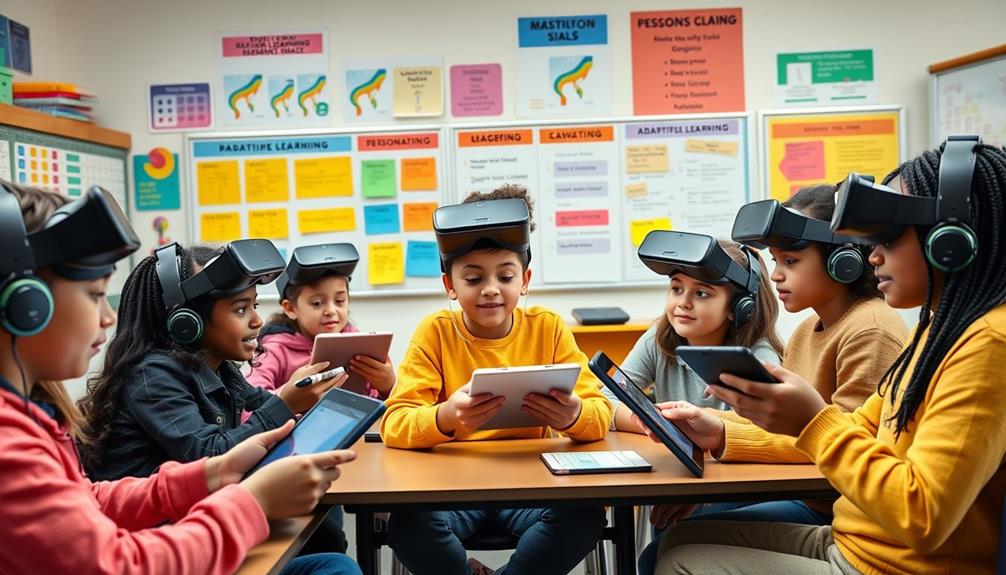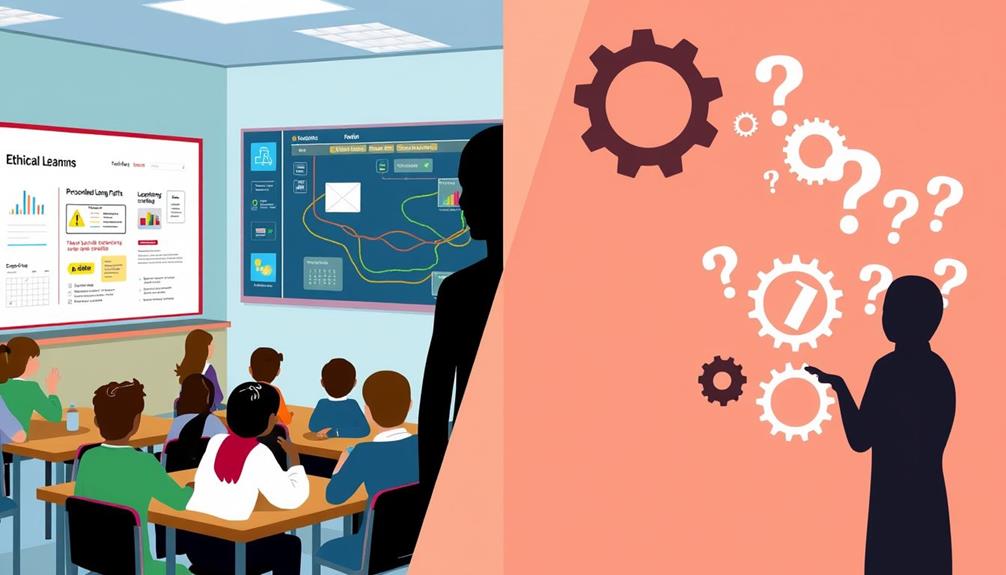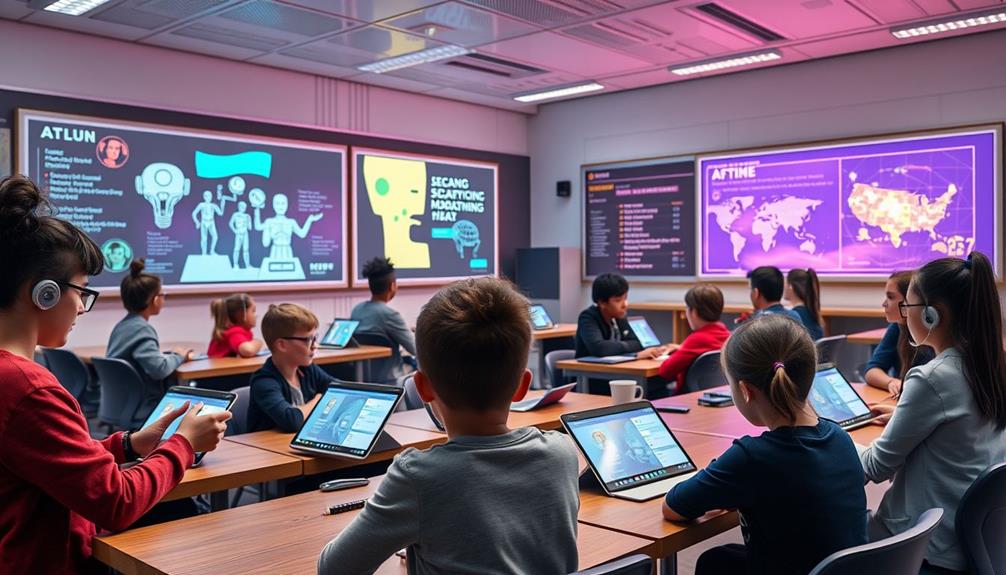AI-driven personalization in e-learning transforms how you learn by tailoring experiences to your unique needs and preferences. Adaptive learning systems assess your performance, adjusting content difficulty in real-time. Intelligent tutoring systems offer targeted feedback, helping you master subjects faster than traditional methods. With machine learning identifying gaps in your knowledge, educational materials become more relevant and engaging. You'll find that personalized learning enhances your motivation and academic performance, greatly boosting engagement and satisfaction. Discover how these innovative approaches are reshaping education for everyone, leading to remarkable success stories and better outcomes.
Key Takeaways
- AI-driven personalization enhances engagement and academic performance by tailoring learning experiences to individual student needs and preferences.
- Adaptive learning systems continuously assess performance, adjusting content difficulty for optimal learning outcomes.
- Intelligent tutoring systems provide personalized feedback, enabling students to master subjects significantly faster than traditional methods.
- Data analytics identify learning gaps, allowing for customized study plans that improve exam preparation and overall achievement.
- Ethical considerations, including data privacy and algorithmic bias, are crucial for responsible implementation of AI in education.
Understanding AI in Education
AI is revolutionizing education by creating adaptive learning systems that personalize the learning experience for each student. These systems utilize data analytics to analyze your performance in real-time, allowing immediate adjustments to content and difficulty levels based on your unique learning needs.
With intelligent tutoring systems powered by AI, you receive personalized feedback and support, simulating a one-on-one tutoring experience that caters to your understanding and pace. Furthermore, the integration of AI technologies in education is addressing ethical considerations, guaranteeing that data privacy and consent are upheld throughout the learning process ethical frameworks required.
Machine learning models predict your performance, identifying learning gaps and creating customized learning paths that optimize your educational outcomes. This means that the curriculum adapts as you progress, guaranteeing you're always challenged but never overwhelmed.
Natural Language Processing (NLP) enhances communication between you and AI systems, making learning interactive and engaging through chatbots and virtual assistants.
The integration of AI with advanced data analytics not only tracks your progress but also guarantees a responsive educational environment tailored to promote your engagement and mastery.
You'll find that this personalized learning approach empowers you to take control of your education, making the learning journey more effective and enjoyable.
Benefits of Personalized Learning

Personalized learning offers a transformative approach to education, allowing you to engage with material that resonates with your interests and learning style. One of the key benefits of personalized learning is how AI-driven personalized learning enhances student engagement. By creating tailored educational experiences, you can connect more deeply with the content that matters to you.
Additionally, incorporating family activities that enhance digital skills can help reinforce learning outside the classroom. Customized learning paths, developed through AI analysis of your performance data, optimize instructional content and pacing, ultimately leading to improved academic performance. Real-time feedback from AI systems enables you to correct mistakes promptly, enhancing comprehension and retention of the material.
Moreover, personalized learning experiences boost your motivation and reduce frustration, which translates to lower dropout rates and higher satisfaction. This approach is especially beneficial for diverse student populations, as AI-driven personalized learning can scale to meet individual needs, reaching learners in underserved or remote areas.
Mechanisms of AI Personalization

In today's educational landscape, adaptive learning systems are revolutionizing how you experience e-learning by continuously evaluating your performance in real-time. These systems adjust the content difficulty to match your unique learning pace and style, making certain you stay engaged and challenged.
As with the significance of setting realistic goals in healthy living, personalized learning paths empower you to achieve your educational objectives. Intelligent tutoring systems further enhance this experience by providing on-demand, tailored feedback that simulates a one-on-one tutoring session, addressing your specific understanding level.
Data analytics plays an essential role in this personalization. By analyzing large datasets, AI can predict your performance and identify any learning gaps, allowing for customized learning pathways that focus on your strengths and weaknesses. This targeted approach guarantees that you receive the support you need to succeed.
Moreover, Natural Language Processing (NLP) facilitates effective communication between you and the AI system, creating interactive learning experiences that boost your engagement and comprehension.
Machine learning models continuously assess educational materials' effectiveness, adapting them based on your feedback. This dynamic process assures that your learning experiences remain relevant and effective over time, ultimately leading to a more personalized learning journey tailored just for you.
Real-World Applications

In exploring real-world applications of AI-driven personalization in e-learning, you'll find compelling case studies that showcase successful implementations.
These examples illustrate effective strategies and highlight the success metrics that indicate improved student outcomes.
As the demand for skilled professionals in tech continues to rise, particularly in areas like AI training jobs, understanding how AI enhances the learning experience becomes increasingly essential.
Case Study Examples
Numerous case studies illustrate the transformative impact of AI-driven personalization in e-learning. Schools and educational platforms are leveraging AI technology to craft personalized learning opportunities that cater to the unique needs of every student.
This approach can be particularly beneficial for students dealing with emotional challenges, similar to those experienced by children of borderline mothers. Here are some compelling examples:
- A school district implementing AI tools saw a 15% increase in overall student performance and a 20% improvement in engagement metrics within the first year.
- DreamBox Learning's personalized math curriculum enabled students to grow an average of 1.5 grade levels in just one academic year, showcasing the effectiveness of adaptive and responsive learning.
- Squirrel AI successfully tailored study plans for over 20 million students, leading to notable improvements in examination scores, proving that AI in personalized learning can drive success.
- Carnegie Learning's MATHia program provided targeted feedback that resulted in a 30% increase in students mastering key math concepts, illustrating how personalized learning can improve educational outcomes.
These case studies highlight how AI-driven solutions can notably enhance student performance and satisfaction, paving the way for a more effective and engaging educational experience.
Implementation Strategies
Effective implementation strategies are essential for harnessing the full potential of AI-driven personalization in e-learning. By leveraging AI technologies, schools can create personalized learning experiences that adapt to individual needs. Successful strategies often combine intelligent tutoring systems with data analytics to optimize resource allocation and enhance teaching methodologies.
Here's a table summarizing key implementation strategies:
| Strategy | Description |
|---|---|
| Adaptive Learning Systems | Adjusts content difficulty based on real-time metrics |
| Intelligent Tutoring Systems | Provides targeted feedback tailored to each student |
| Personalized Study Plans | Aligns with individual needs for effective exam prep |
| Data Analytics | Analyzes performance to inform dynamic adjustments |
| Collaborative Learning Tools | Encourages peer interaction to improve outcomes |
Platforms like DreamBox Learning and Squirrel AI exemplify these strategies, showcasing improved student outcomes and retention rates. By implementing these approaches, educational institutions can guarantee a more effective learning environment. Ultimately, your commitment to these strategies will help maximize the benefits of AI-driven personalization, leading to a more enriched educational approach that meets the diverse needs of students.
Success Metrics
Measuring the success of AI-driven personalization in e-learning reveals the tangible benefits these strategies bring to educational settings. When you implement personalized learning, you're likely to see significant improvements in several key areas, including the potential for risk management strategies that can enhance student performance.
Schools have reported a 20% improvement in student test scores after adopting tailored educational experiences that align with individual performance metrics.
AI education platforms have shown a 30% increase in student engagement, especially among diverse demographics benefiting from customized learning paths.
With intelligent tutoring systems, students achieve mastery in subject areas 40% faster compared to traditional learning environments.
Those using AI analytics to monitor learning progress have seen a 25% reduction in dropout rates, highlighting the effectiveness of personalized education in keeping students enrolled.
Additionally, surveys indicate a 90% satisfaction rate among users, showcasing a strong link between these tailored experiences and increased student motivation.
Challenges and Ethical Considerations

When you implement AI in e-learning, data privacy becomes a top concern that you can't overlook. You need to guarantee that sensitive student information is handled ethically and complies with regulations like FERPA and GDPR.
Furthermore, as cybersecurity and ethical hacking comparisons highlight, understanding and mitigating risks associated with data breaches is vital in maintaining trust.
Additionally, you must be wary of algorithmic bias, as it can unintentionally perpetuate inequalities if not properly managed.
Data Privacy Concerns
Data privacy concerns in AI-driven personalized learning are critical issues that educators and institutions must address. As you navigate this landscape, consider the following key points:
- Robust Policies: Institutions need strong frameworks to protect sensitive student information from unauthorized access and breaches. The increasing use of credit cards online means that data security must be prioritized to safeguard personal information effectively.
- Ethical Questions: The collection of vast amounts of student data raises concerns about consent, ownership, and potential misuse of personal information.
- Regulatory Compliance: Adhering to laws like the Family Educational Rights and Privacy Act (FERPA) is essential to safeguard student data effectively.
- Monitoring and Evaluation: Continuous oversight of AI systems is necessary to guarantee ethical standards and mitigate risks associated with data privacy.
Without algorithmic transparency, biases in AI systems can result in discriminatory practices that adversely affect certain student demographics. This lack of clarity can lead to personal information misuse.
You must prioritize student data privacy by implementing robust policies and guaranteeing regulatory compliance, while actively engaging in monitoring and evaluation. Addressing these data privacy concerns not only protects students but also fosters trust in AI-driven educational environments.
Algorithmic Bias Issues
Although AI-driven personalization holds great promise for enhancing learning experiences, algorithmic bias presents significant challenges that educators must confront. Biased algorithms can lead to unequal educational outcomes, often favoring specific demographics and exacerbating existing inequalities. If AI systems are trained on historical data that reflect societal biases, they may perpetuate discrimination, particularly against students from marginalized backgrounds.
Moreover, similar to the challenges faced in finance, the risks associated with algorithmic bias demand careful consideration and mitigation strategies to protect all learners and foster equitable outcomes, similar to how one might consider the risks and considerations involved in investment strategies.
To tackle these issues, ethical considerations must guide your approach to AI in education. Regular audits and assessments of algorithms are essential to identify and mitigate biases, ensuring fair treatment for all learners. Emphasizing diverse representation in the datasets used to train AI can help create more accurate and effective recommendations that cater to the needs of all students.
Addressing algorithmic bias requires collaborative efforts among educators, technologists, and ethicists. Together, you can work towards developing transparent AI systems that prioritize equity and inclusivity in personalized learning environments.
Future Trends in AI Education

As AI continues to evolve, the landscape of education is set to undergo transformative changes that enhance learning experiences.
You'll see the integration of various technologies that promise personalized learning with AI, making education more accessible and effective. By incorporating elements like fun in goal achievement, educators can inspire students to set and reach their academic goals with enthusiasm.
Here are some future trends to watch for:
- Immersive Learning Experiences: Expect augmented reality (AR) and virtual reality (VR) to create engaging educational environments that boost knowledge retention.
- AI-Driven Curriculum Development: Predictive analytics will help educators develop content that adapts to students' evolving learning needs, ensuring relevance.
- Continuous Monitoring: AI systems will track student progress, allowing for targeted support and timely interventions tailored to diverse learning requirements.
- Instant Feedback Mechanisms: Students will receive immediate feedback, expediting their learning process and optimizing resource use for better outcomes.
These trends not only promote equity in education by offering tailored experiences for students from various backgrounds but also pave the way for a future where everyone can thrive academically.
Success Stories in E-Learning

In recent years, the impact of AI-driven e-learning has been truly remarkable, with schools and students reaping significant benefits. For instance, one school district implemented AI tools and saw a 15% increase in overall student performance and a 20% reduction in dropout rates within the first year.
AI offers tremendous potential to create a personalized approach to education, catering to students' unique needs.
DreamBox Learning is another success story, where students improved their math proficiency by an average of 1.5 grade levels in a single academic year. Similarly, Squirrel AI's adaptive learning platform in China achieved a 30% higher exam performance compared to traditional methods, showcasing an effective educational strategy.
Carnegie Learning's MATHia program provided targeted feedback, leading to significant understanding gains for over 85% of students.
Moreover, a case study revealed that 90% of users reported increased motivation and engagement, thanks to tailored content delivery.
These stories illustrate how leveraging AI enhances the learning experience through individualized learning paths, ultimately improving educational outcomes and student performance.
It's clear that embracing AI-driven e-learning can transform educational journeys for students everywhere.
Frequently Asked Questions
How Does AI Help Personalize Education for Students?
AI personalizes education by analyzing your performance in real-time, adjusting content difficulty to fit your pace. It offers tailored feedback and creates customized learning paths, ensuring you receive the support needed to succeed.
What Is AI Driven Personalization?
Did you know that 75% of students learn better with personalized approaches? AI-driven personalization uses algorithms to tailor experiences, adapting content and feedback to fit your unique learning style, enhancing engagement and improving educational outcomes.
How Is AI Used in E Learning?
AI's used in e-learning to adapt content to your needs, analyze your performance, and provide instant feedback. It personalizes your learning experience, ensuring you get the right support and resources at the right time.
What Role Can AI Play in the Creation of Personalized Virtual Learning Experiences?
AI can transform your virtual learning experience by adapting content to your needs, offering instant feedback, and providing 24/7 support. It helps identify your strengths and weaknesses, ensuring a customized educational journey that keeps you engaged.
Conclusion
Incorporating AI-driven personalization in e-learning transforms education, making it more engaging and effective. Did you know that personalized learning can increase student retention rates by up to 50%? This statistic highlights the power of tailoring education to individual needs. As we embrace these innovations, you'll find that personalized learning not only enhances understanding but also fosters a love for learning. The future of education is bright, and AI is at the forefront, ready to unleash each learner's potential.










